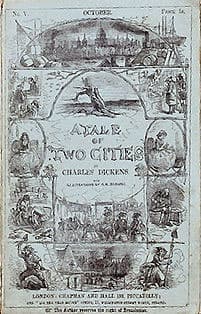A Tale of Two Cities
Critique • Quotes
 Serial, 1859
Serial, 1859First publication
1859 in 31 weekly instalments
First book publication
1859
Literature form
Novel
Genre
Literary
Writing language
English
Author's country
England
Length
Approx. 139,000 words
Notable lines
It was the best of times, it was the worst of times, it was the age of wisdom, it was the age of foolishness, it was the epoch of belief, it was the epoch of incredulity, it was the season of Light, it was the season of Darkness, it was the spring of hope, it was the winter of despair, we had everything before us, we had nothing before us, we were all going direct to heaven, we were all going direct the other way....
— First line
A wonderful fact to reflect upon, that every human creature is constituted to be that profound secret and mystery to every other. A solemn consideration, when I enter a great city by night, that every one of those darkly clustered houses encloses its own secret; that every room in every one of them encloses its own secret; that every beating heart in the hundreds of thousands of breasts there, is, in some of its imaginings, a secret to the heart nearest it! Something of the awfulness, even of Death itself, is referable to this. No more can I turn the leaves of this dear book that I loved, and vainly hope in time to read it all. No more can I look into the depths of this unfathomable water, wherein, as momentary lights glanced into it, I have had glimpses of buried treasure and other things submerged. It was appointed that the book should shut with a spring, for ever and for ever, when I had read but a page. It was appointed that the water should be locked in an eternal frost, when the light was playing on its surface, and I stood in ignorance on the shore. My friend is dead, my neighbour is dead, my love, the darling of my soul, is dead; it is the inexorable consolidation and perpetuation of the secret that was always in that individuality, and which I shall carry in mine to my life's end. In any of the burial-places of this city through which I pass, is there a sleeper more inscrutable than its busy inhabitants are, in their innermost personality, to me, or than I am to them?
Mr. Cruncher himself always spoke of the year of our Lord as Anna Dominoes: apparently under the impression that the Christian era dated from the invention of a popular game, by a lady who had bestowed her name upon it.
"Repression is the only lasting philosophy. The dark deference of fear and slavery, my friend," observed the Marquis, "will keep the dogs obedient to the whip, as long as this roof," looking up to it, "shuts out the sky."
"I have sometimes sat alone here of an evening, listening, until I have made the echoes out to be the echoes of all the footsteps that are coming by and by into our lives."
Liberty, equality, fraternity, or death;—the last, much the easiest to bestow, O Guillotine!
I call myself Samson of the firewood guillotine. See here again! Loo, loo, loo; Loo, loo, loo! And off her head comes! Now, a child. Tickle, tickle; Pickle, pickle! And off its head comes! All the family!"
"...tell the Wind and Fire where to stop, but don't tell me."
"It is a far, far better thing that I do, than I have ever done; it is a far, far better rest that I go to, than I have ever known."
— Last line
Critique • Text

